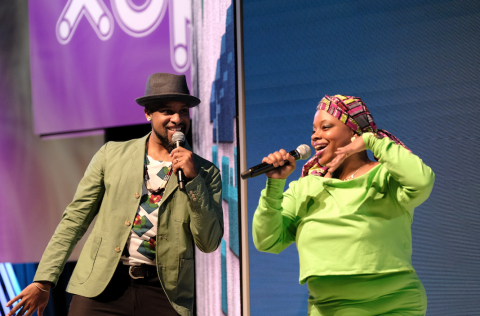From a New Payment Model to Deconstructed F&B, Choice Reigns at XDP 2019

The third annual Xperience Design Project hosted by ASAE took place at Gaylord National Resort & Convention Center outside Washington D.C. on April 11-12. Known for being a conference that challenges the status quo of the industry, the two-day event attracted 1,654 attendees from 40 states and eight countries.
One major change implemented at this year’s event was a new pricing structure. Attendees registered for XDP for free while on-site in Chicago for ASAE’s Annual Meeting & Exposition last summer, then were asked to pay what they felt the event was worth after attending XDP.
While feedback is still coming in, XDP’s planning team—which includes Amy Ledoux, senior vice president of meetings and expositions; and Krista LeZotte, associate director of meeting operations and special events—says that so far, the model has seen some success. As of last week, 21 percent of VIP attendees had responded to the initial invoice; of those 21 percent, 70 percent have paid something, with the majority paying the suggested price of $295.
Another change at XDP 2019 was eliminating required appointments for the Business Exchange portion of the event, which had been required in past years. This allowed everyone the opportunity to have business conversations in this space, according to the organizers. Partners who wanted an option to meet at a scheduled time could still do so at a table in a designated appointment area, while others who preferred organic conversations had room to network freely.
When it came to F&B, the organizers sought to shake things up this year by providing high-protein, grab-and-go breakfast options for attendees to start their day similarly to how they might do so at home as part of a healthy lifestyle. Throughout other parts of the event, they also experimented with setting up F&B in lounges and corners of the rooms, designed to showcase food as a conversation starter for doing business.
Closing out XDP on a high note, the “FriYay Experience” left attendees—or co-creators, as the organizers refer to them—walking away feeling energized and enthused about what they’d learned through the event. They brought in entertainer Nina West, a drag queen based in Columbus, Ohio, who appeared on RuPaul’s Drag Race, as a nod to the 2019 ASAE Annual Meeting taking place in Columbus Aug. 10-13.
Ledoux and LeZotte have continued to evolve the experience of XDP since it first launched three years ago, making adjustments in everything from customized learning itineraries to a hybrid appointment/networking area, as well as experimenting with different uses of the venue space.
Their efforts have paid off, with attendee satisfaction running high.
“I enjoyed that the education was specifically geared towards my interests, which I was asked about ahead of time,” says Joby Strobo, strategic partnerships director with Texas Society of Association Executives, who participated in XDP this year. “You know going into the event that… you have control to map out your own experience. That was exciting for me.”
Steven Stout, executive director with TSAE who also attended, concurred. “I really loved the way the appointments space was set up,” he says. “When you didn’t have an appointment, you were getting snippets of information from the presentations on the show floor.”
The food activations were also a hit with Stout. “I loved the way lunch was ‘deconstructed’ with elements of the meal at various booths, along with the various activation stations,” he says.
At the end of the day, XDP focused on giving co-creators the power of choice—something from which all event organizers should take note.


Add new comment